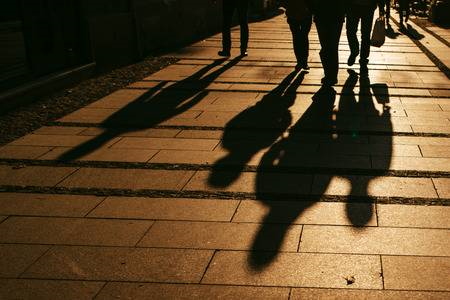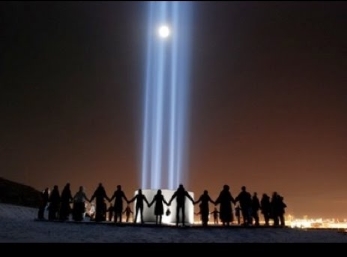
LIE: We should keep quiet and not entertain conspiracy theories.
TRUTH: We should seek the truth and not be afraid to speak about anything, even so-called ‘conspiracy theories.’
For we do not wrestle against flesh and blood, but against principalities, against powers, against the rulers of the darkness of this age, against spiritual hosts of wickedness in the heavenly places. Therefore take up the whole armor of God, that you may be able to withstand in the evil day, and having done all, to stand. Stand therefore, having girded your waist with truth . . . — Ephesians 6:12–14
To sin by silence, when we should protest / Makes cowards out of men. — Ella Wheeler Wilcox, from the first lines of her poem, Protest[1]
Introduction
IT IS NOT the purpose of this paper[2] to try to prove any conspiracy theory to be true. My purpose is to encourage you to seek for, to think objectively about and to speak the truth as you discern it to be, all the while being aware of our proclivity to silence ourselves out of fear. If we do speak the truth, we will be in good company – Jesus himself said, in answer to Pontus Pilate:
. . . “You say rightly that I am a king. For this cause I was born, and for this cause I have come into the world, that I should bear witness to the truth. Everyone who is of the truth hears My voice.” — John 18:37
Some Christians engage in the culture wars of same-sex marriage, transgenderism, or get embroiled in debates over racism or forms of politically-incorrect speech. All that can be good, but I’m not here to talk about that. A clear line of socially-acceptable subject matter exists that Christians rarely cross. And if someone does dare to cross that line, his fellow believers, at least in most circles, will invariably join the world in immediately dismissing, even ridiculing him and casting the dreaded epithet: ‘conspiracy theorist!’
The following topics have become or have always been taboo. It’s by no means an exhaustive list, but I list these, not because I believe them to be true, but that they are – for some reason – practically unmentionable.
| vaccine injury | drone wars | false-flag terror |
| 9/11 | directed energy weapons | flat earth |
| chemtrails | mind control experiments | CIA drug running |
| moon landing hoax | fluoridated water | American empire |
| weather modification | weaponized music | 5G wireless radiation |
| climate change hoax | smart meter radiation | perpetual war |
| BPA and ‘gender-bender’ compounds | Google/Facebook surveillance state | JFK assassination |
When we allow a subject to become taboo, we also allow it to take on a spiritual power that can control us. Fear then sucks at the life of our relationships. But sometimes, just simply acknowledging the subject can break its power.
Paul, speaking to the Ephesian Christians, encourages them to walk in the light:
And have no fellowship with the unfruitful works of darkness, but rather expose them. For it is shameful even to speak of those things which are done by them in secret. But all things that are exposed are made manifest by the light, for whatever makes manifest is light. Therefore He says:
“Awake, you who sleep,
Arise from the dead,
And Christ will give you light.”See then that you walk circumspectly, not as fools but as wise, redeeming the time, because the days are evil. — Ephesians 5:11–16
Here Paul admonishes Christians to be the light that exposes what is done in secret, and not so much to speak about it. But it appears those shameful secrets, whatever they were, were commonly known. Contrast that to present day when propaganda has, in effect, created an entire false reality – the false reality that hides these ‘conspiracy theories.’ As Christians, we must use discretion when speaking of these things, but the truth is, unless we live a life of love and truth as Paul exhorts us, we will have no platform, no credibility from which to speak these truths anyway.
I confess that, for too long, I have allowed myself to be cowed – intimidated into silence by an unnamed spirit on these and other topics. They have in effect become off-limits. Admittedly, to broach any of these subjects requires discretion and wisdom, but by and large those are not the reasons I’ve been silent.[3]
The reasons I’ve been silent are primarily:
- fear of misunderstanding
- fear of offending
- fear of ridicule and rejection
- fear of derailing and dominating conversations — ‘dropping bombs’.
But on the rare occasion when I have brought up a ‘conspiracy theory,’ the typical Christian objection goes something like this:
Yes, but what does that have to do with the gospel and our life in Christ?
If the dismissal of ‘conspiracy theorist!’ doesn’t shut down any potential discussion, this objection is almost sure to do so. Such dismissals, though well-meaning, fail to consider that some of these ‘conspiracy’ subjects may be true or at least partially true. Sure, we can ‘go off the deep end’ and become obsessive about them. And yes, they certainly can become distractions, but that’s not typically the problem. Typically the problem is the opposite – we assiduously avoid them.
Here are five reasons that should motivate Christians to speak with wisdom, humility, discretion and compassion.
The five reasons are:
- to expose and further prevent the worship of false gods and idolatry.
- to expose and further prevent the impairment of our human faculties.
- to expose and further prevent injury, death and destruction.
- to expose and further prevent deception and to enlighten and awaken.
- to expose and further prevent unnecessary shame and disgrace.
Christians should speak:
1 To expose and further prevent the worship of false gods and idolatry
Some, but not all of these conspiracy subjects either engage in, or may lead to, idolatry. Idolatry was Israel’s besetting sin; it was the paramount sin that drew the Lord’s judgment. After all, it topped the chart of the Ten Commandments. The problem today is, most don’t understand or recognize its modern-day practices or equivalents.

For example, it’s becoming obvious that Google, among other major internet companies, has become god-like – omniscient, omnipotent, omnipresent and practically unassailable. Our passive use of their services allows them to – over time – effectively gain control of our lives. For more on this, see the article: LIE: Passive use of the internet is harmless, part one, two and three.[4]
This reason alone could sufficiently motivate us to speak up, but there is more.
2 To expose and further prevent the impairment of our human faculties
This reason is closely related to number one above.
To understand this point we need to understand the basic mechanism of idolatry. Psalm 115 conveys this idea well:
Why should the Gentiles say,
“So where is their God?”
But our God is in heaven;
He does whatever He pleases.
Their idols are silver and gold,
The work of men’s hands.
They have mouths, but they do not speak;
Eyes they have, but they do not see
They have ears, but they do not hear;
Noses they have, but they do not smell;
They have hands, but they do not handle;
Feet they have, but they do not walk;
Nor do they mutter through their throat.
Those who make them are like them;
So is everyone who trusts in them. — Psalm 115:2–8
We become what we behold.
For a fuller explanation of how idolatry works, see my articles: Lie: Idolatry is rare, part 1 and part 2. And the lie: I can be a god, part 1 and part 2.
Here’s a quick definition:
Idolatry – awe, adoration or fascination of a person, object or idea from which we falsely imagine to derive pleasure, protection or well being. It is a deception that warps our perception and becomes an all-important and indispensable obsession that we invest with power and that ultimately, if not destroyed, becomes a snare that hollows out our souls. The only remedy to idolatry is to worship the true and living God, because we cannot not worship something.
Idols come in many forms, from the puny to the mammoth, from the physical to the mental to the emotional, from the obvious to the almost imperceptible.
Idolatry massively impairs and disgorges human beings. As a result people now find it harder to think, to listen and pay attention, to feel[5], to empathize, to speak, to read, to remember, to sleep, to move and to act. The passive use of technology is impairing basic human faculties; consequently, our ‘bandwidth’ of faculties attenuate until we effectively become non-functional.
Here’s the big point: It’s bad enough that we’re losing these abilities but it’s especially bad because, at some point, the impairment will become so severe that people will find it increasingly difficult to grasp the gospel of Jesus Christ, to process it intellectually or emotionally or otherwise.
This breakdown of fundamental human abilities is a direct attack on humanity itself and runs parallel with the transhumanist movement, so that, as humanity degrades, the need and opportunity to merge with systems – software, hardware and ‘wetware’ – increases. A coincidence? Maybe, but whether it is or not, the effect is the same. The real danger is in the loss of our humanity, which in effect is the loss of our souls.

Can an impaired humanity truly hear and respond to the gospel? What would be the signs of such a state of affairs? Assuming we haven’t reached this state yet, how far are we from it? Can it be reversed? slowed or shut down?
Although we always have hope in God, I have no answers to these questions.
3 To expose and further prevent injury, death and destruction
Let me state it as plainly as I can: The principalities and powers of this world have unleashed multiple vectors of injury, death and destruction. Manifestations of this culture of death include:
| abortion | transhumanism | chemtrails/geoengineering |
| euthanasia | war | weather modification |
| robotics/AI | divorce | ‘estrogen-mimicking’ compounds |
| mind control | child abuse | pervasive pornography |
| evolution | eugenics/genetics | transgenderism |
| slavery/trafficking | psychosurgery | psychiatric drugs |
| electroshock therapy |
These and other programs poison, damage, corrupt, deceive, desensitize, alter, create dysfunction or mayhem, enslave, irradiate, and kill in various ways, either subtly or overtly, suddenly or over time. For a long time I resisted the possibility of such a shocking prospect. But the evidence became so overwhelming that I could not ignore the reality any more.
4 To expose and further prevent deceptions and to enlighten and awaken
Mark Twain said it best:
It’s easier to fool people than to convince them that they have been fooled.
I remember distinctly in 2008 when the scales fell from my own eyes. I discovered, somewhat by accident, the YouTube videos of the World Trade Center Building Seven collapsing into its own footprint – to any common-sense person, an obvious controlled demolition. Building seven was the 47-story tower that few outside New York City know about. Even to this day most people think only two towers fell that day. But actually this third tower fell after five-o’clock on the same day – September 11, 2001. Thankfully no one was injured since the building had been evacuated.
At first I couldn’t quite imagine the rationale – why would someone in our government want to do this and blame it on our enemies? It seemed preposterous to me. I had never heard of false-flag terror before. But the combined evidence was too strong; then, I swallowed the ‘red pill’ to see how far the rabbit hole went. Since that day, life has never looked the same and I still haven’t found the bottom yet.
With 9/11, I realized that what I had been told about America was seriously flawed. Suddenly I started looking seriously at things I had never considered before, reasoning that, If I could be duped that badly, how else had I been deceived? Vaccines, climate change, mind control weapons, etc – it was all suspect. Suddenly I had a new window to look at the world. Yes, it was humbling to admit I’d been duped (even to myself), but it was also liberating and at the same time frightening; apparently the dark forces that the Bible talked about were actually real and were causing real harm in the world.
Although I’ve had my share of heartache as an American, white, middle-class, suburban, evangelical male, I’ve also had every privilege normally granted to such. And as such, I can say I have not really experienced first-hand much of the evil present in the world. Surely my ‘bubble’ has contributed to my deception, but I can’t say that it fully explains it.

Like any good student of theology, I accepted the reality of evil philosophically and theologically, but I think in many ways, that’s as far as it went. I knew evil individuals existed – they were the psychopaths, the serial killers, the mass murderers, the Hitlers, the Stalins and the Pol Pots of the world. Yes, the corruption was real enough – the bribery and blackmail of officials, politicians and judges, the mafias and crime rings – everyone acknowledged the reality of these evils. But what I did not see and was actually not willing to see was the depth and scope of sin’s infection of society in general. I could quote the verse:
. . . for all have sinned and fall short of the glory of God, . . — Romans 3:23
But I only translated this in terms of how individuals and families affect society. To me it was a ‘spiritual,’ that is, an internal/pietistic problem. For me, sin could not infect politics or economics or education or medicine. Yes, there were societal evils and problems that could be traced to sinful men, but this was all haphazard, incoherent, and unorganized.
And yes, I believed that Satan somehow conspired to inflict suffering and death in the world, but the connection between Satan and men and the organizations of men – public, private and secret – must be an unfathomable mystery.
To put it plainly, I failed to imagine how evil and powerful and purposeful men and women could be. I failed to see that evil men – in many cases the psychopaths and sociopaths of the world – did not possess the conscience and scruples that ordinary men have, and therefore had no trouble lying, cheating, stealing and even injuring and murdering to gain and keep power over others. Yes, I knew this existed on a relatively small scale in local or regional mafias and cartels, but I lacked the imagination, the courage to see it on a grander scale.[6]
I say courage because, to be honest, I did not want to see it.
Honestly, the prospect that things such as 9/11 or the moon landing hoax or the JFK assassination could be anything else than what I was told, was terrifying. If such things could be true or even to entertain that such things could be true, would be a sea change. It would cause me to question many other things that I held dear.
So the question is: will we be men and women of faith and courage? Will we put our faith and trust ultimately in God alone? Are we willing to put our whole lives on the altar? How we answer those questions will determine whether and to what extent we will be deceived or enlightened.
5 To expose and further prevent shame and disgrace
What if I’m right and yet effectively do nothing? What if I’m right and you dismiss my warnings without sincerely listening? Then one day, when the truth finally comes out, and it will, either in this life or the next, and then it’s discovered that you could have done something but didn’t, you will have to accept your shame and disgrace; you will have to answer those who ask: ‘Did you know about this? Why didn’t you tell me?’
Let me ask you — if you saw black smoke coming through the window of your neighbor’s house, what would you do?
- A ignore it – it’s probably nothing.
- B check it out – something is not right.
- C call 9-1-1 – the evidence is clear, time to act; any delay in response could be deadly.
Maybe you’re not ready for option C, but I would hope you would care enough to at least choose option B. The black smoke may be caused by something benign, but more than likely it’s literal fire. At least it’s worth checking out. Or, for you, maybe the smoke is not black, but gray, or maybe you only smell smoke. Either way, I think most would agree that choice A is irresponsible.
Of course I cannot force my way and if I’m not careful in how I broach these subjects, I could easily make a nuisance of myself. But I’m not going to do that. So what I am doing is making an invitation: I’m inviting you to prayer and to dialog either on this website or in a community that you trust, whether online or off.
Conclusion
I don’t have all the answers – no one does. We really need to seek God together. Truly Jesus is our only salvation.
Seeking is sincerely and earnestly asking serious questions, so seeking God is asking God serious questions. We all have questions – questions about birth and life and death; questions about God and men and angels and demons; questions about how we should live, and what we should do.
But what are your questions? What perplexes you, nags you; what would you ask if you knew you could get real answers? Or have you stopped asking? Have we become too cynical to sincerely ask about life or death or God or why we can’t seem to stop our besetting sin? This is real faith – not to imagine we have all the answers, but to believe enough to ask a sincere question, believing that we can actually get an answer, an answer from God, an answer that shows us how to live in the world.
Like Neo in The Matrix, something gnaws at your brain; you don’t know what it is, but it’s driving you crazy, and yet you keep a manageable distance from what it may mean. I believe that we all have questions – none of us have it all figured out. But some of us have forgotten how to ask; or maybe we’re too proud or too afraid that we won’t find any real answers or what the answer may be. But real answers do exist – true and complete and good answers, and not just Pollyanna ones.
But if we’re not careful we’ll grow content with the superficial, the surface, the packaged, pat answers. Most today are too easily pacified with the superficial, with the answers designed to shut down more dialog, answers designed to control how we think. This is especially true in the age of surveillance capitalism[7] and social media.
Yes, we’ll never have all the answers, but that’s not the goal anyway. If it was, life would lose its mystery and meaning in God Himself, seeing Him as the question and the answer and learning to walk through life with Him. Life has gotten so complex and the pace of change is accelerating so fast that our traditions, our foundations have worn down until it seems nothing firm is left to stand on.

No one person can stand against the onslaught, the tsunami that threatens to bury us all. Like never before, we must seek for answers together; we must recognize our vulnerabilities as men and women and come together to seek for answers. This is what it means to seek God.
I’m convinced that the main reason we don’t seek God is because we don’t see or feel our need, our true vulnerability. Why should we pray if things are not that bad – if we don’t seriously see much danger? Consequently, our prayers tend to be routine, predictable and perfunctory.
My hope is that we will learn to rise up in the strength
of the Lord and seek for the truth and ask serious questions, even if it
happens to be about a ‘conspiracy theory.’ I pray that we learn to wrestle with
the enemy and serve our families and churches and do all we are called to do in
this hour.
[1] For the entire poem see https://www.poets.org/poetsorg/poem/protest
[2] This article will be more autobiographical than most; I have wrestled a lot with this lie.
[3] Also, just to be clear, not all so-called ‘conspiracy theories’ are valid, but even if a subject is valid I should first have something worth saying, some hard evidence, before I open my mouth. It’s a common but irrational assumption that if someone believes one conspiracy, he must believe them all. That’s simply not true.
[4] See also Shoshana Zuboff’s masterful work, The Age of Surveillance Capitalism, in which, in great detail, she unmasks the hidden, decades-long extraction of behavioral data by the likes of Google and Facebook – all designed to predict and ultimately control our behaviors.
[5] The ability to feel emotion should encompass a broad range of emotions. Our capacity to feel in terms of depth and nuance and breadth, and express and communicate those emotions is being impaired. The practice of idolatry reduces and hollows out our capacity to feel, until now, most of what we can express is either anger/rage or desire. Other emotions: affection, awe, gratitude, pity, delight, shame, serenity, etc get masked or morphed.
[6] Personally I do not believe in one monolithic conspiracy, except at the spiritual wickedness in high places level (Ephesians 6). Rather, on the human level, more than likely there are competing global, regional and other factions that occasionally may coordinate their efforts for mutual ‘benefits.’
[7] Again, see Shoshana Zuboff’s book The Age of Surveillance Capitalism.